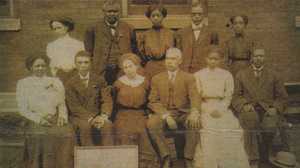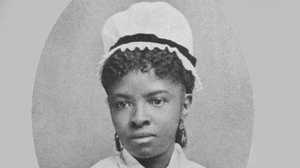Living with Segregation
Segregation at work
He went across the hall and went to Dr. Blalock's office and said, I would like my pay. The way you talked to me this morning, I can't take that. I wasn't raised that way. And I want my pay. — Nat Crippens, North Nashville community historian, describing Vivien Thomas's reaction after an angry Dr. Blalock swore at him.
Quitting a job was often the only way to resist mistreatment on the job. The few labor laws that existed did not protect black workers. Talking back and openly resisting abuse was dangerous. Under the conditions of Jim Crow, African Americans frequently changed jobs, leaving whites complaining about the shiftless nature of black workers.
African Americans were confined to the least paid, least desirable, most dangerous and unstable jobs. White workers often went on strike to prevent black workers from being employed in "white" jobs. Black women were almost entirely limited to working as domestic laborers.
In the end, Vivien Thomas could work or not work for Dr. Blalock. He could go someplace else, and Dr. Blalock knew it... I think we have to understand that race relations and Jim Crow were not just a static system. There is a lot of negotiation going on between the races at all times. — Don Doyle, historian
He actually apologized to this nineteen year old youngster. — Nat Crippens, North Nashville community historian
Living with Segregation: At School
I knew we had old textbooks. I could see the old textbooks from other white high schools like the math books or the algebra book — clearly a hand-me-down. — Kwame Lillard, Nashville civil rights leader
For every dollar invested in white public schools, the Nashville Board of Education only spent fifty cents for black schools. Black teachers were paid less than their white colleagues. New programs instituted in the progressive era were channeled to white institutions, while black schools were systematically neglected.
I knew it was a little raggedy. But the Pythagorean theorem is ancient. It's all in that book anyway. So, you learn the material to fight with... Our teachers told us to look past the age of the book. Don't worry about it, where it comes from. That's a game to try and throw you off, you know. And -- it didn't work. We got the information from our teachers who told us, you got to be prepared, son. — Kwame Lillard, Nashville civil rights leader
On February 23, 1942, my older brother Harold filed suit on his own behalf and on behalf of others, challenging the validity of the action of the Board of Education of Nashville, Tennessee, in establishing fixed schedules of compensation for teachers which provided considerably larger salaries for white teachers than for Negro teachers having the same qualifications. — Vivien Thomas, in his autobiography
Find out more about the outcome of one of the first successful civil rights cases, argued by future Supreme Court justice Thurgood Marshall.
Living with Segregation: At the Movies
If you went to the theatres, you would go in the front and you'd pay money and you'd go around to the side and go up the stairs to the balcony to watch a movie. — Elizabeth McClain, Nashville civil rights leader
When they needed popcorn or Cokes or something like that, they would have to go downstairs, go out, come around and get whatever they need to go back up to that balcony.— Bobby Lovett, historian
Black residents of Nashville created a separate world to escape the indignities of Jim Crow. There was a black business district downtown with banks, a publishing house and many independent entrepreneurs. In North Nashville, there were three predominantly African American institutions of higher learning. Black leaders and intellectuals, a strong middle class, and working class blacks formed a vibrant community in these neighborhoods. The neighborhood provided all services, from stores to movie theaters, from churches to funeral homes, schools, a library and a fire department.
We did not go to the white movies, because I refused to go through the alleys.— Marcus Gunter, former Vanderbilt colleague of Vivien Thomas
Living with Segregation: On Public Transportation
In 1896, Homer Plessy lost a civil rights case against John Howard Ferguson. The U.S. Supreme Court upheld the classification of separate railway cars for whites and blacks on interstate trains as constitutional. The "separate but equal" Plessy v. Ferguson decision affirmed the countless local and state regulations that had been developing for more than two decades.
In 1905, the white majority in the Nashville city council passed a law that required the segregation of street cars.
Conductors are given police power and may abuse and arrest the colored people at will. The law, on its face, shows the mean, low spirit of race hate, for the whole object is to make the Negro feel that he is inferior to the white man, and therefore, unfit to ride on terms of equality with him.'— "The Voice of the Negro 2," Nashville newspaper, December 1905
Compared to other cities, Nashville segregated its streetcars relatively late. During the so-called Progressive Era in the early twentieth century, conditions for African Americans had generally deteriorated under the political leadership of people like Woodrow Wilson.
In Nashville and many other cities, African Americans boycotted the Jim Crow cars and founded their own transportation company.
The race means hereafter to make the white man pay for his prejudice.— "The Voice of the Negro 2," Nashville newspaper, December 1905
The following year, the boycott cost the Nashville Street Car Company $90,000 in revenue. But the city simply did not need two streetcar companies, and the smaller black company soon went out of business.
Living with Segregation: Facing Violence
Until the civil rights movement overturned systematic segregation, thousands of African Americans and other minorities were brutally maimed or killed by white vigilantes taking the law into their hands. Established law, which codified white supremacy, failed to protect the civil rights of black citizens. In the end, white segregation rested on open violence.
At the turn of the century, lynchings occurred every week, and most of the victims, denied the due process of courts, were innocent of the charges held against them. Some were not even accused of having committed a crime. Instead, whites invented the myth of the black rapist and portrayed lynching as a way to prevent the frequent rape of white women by black men. The real causes were economic competition, material greed, or simple terror to prevent blacks from wielding political influence. In some cases, consensual relationships between white women and black men provoked lynching. So-called miscegenation laws were at basis of all segregation legislation. They forbade blacks and whites to marry and have legitimate children. It was not until the mid-1960s that the Supreme Court abolished these laws as unconstitutional.
Nat Crippens, North Nashville community historian
A tense confrontation: It was very early in my life. I was seven years old and I lived on a street of shotgun houses, all of them made of wood, of course. And the boy next door to me when I was seven was seventeen at the time.
He had worked in a white family since he was twelve. And, apparently the family had a daughter who was eleven when he was twelve. And they grew up together. And most of the time during the summer, only the two of them were in the house together. And, inevitably, two kids like that sort of formed a closer relationship than they perhaps should have.
And the father forgot some papers. He was a businessman and came home one day and the boy ran out the back door. And obviously he had been engaged in the most taboo thing in the South at that time. And the only place he ran was home. And that happened in the morning, and by mid-afternoon, the word was around town in both the white and black communities that they were going to lynch him and string him up in front of the big black church, which was about a block from my home.
And both whites and blacks all afternoon were engaged in buying ammunition. And the only place to get ammunition was from a white hardware man. And whites criticized him for selling ammunition to blacks. And he said, "I'm in business. I'm going to sell to whoever will buy."
Anyway, about dusk dark, people began to collect in a vacant lot near my house. And by seven or eight o'clock, there were perhaps four or five hundred people down there, all male, all white. And during the afternoon, my father, who happened to be a minister, and about twenty or thirty other blacks congregated and had prayer meeting in our house. And they got whatever weapons together that they had. And they went next door to where this boy lived and they had vowed that if anybody came to take this boy, they'd have to take them first.
The resolution of the standoff: The top law official came up to the house next door, talked with the people there and was surprised that they were there. And he finally said, "Let's cut out all this small talk. We know this boy's here. We have watched this house ever since he came home. And you might as well give him to me, because they're going to come and get him." And my father and the others told him that they knew what the plan was and that they would not give the boy up.
And he got angry and said -- now, I heard this from my father -- he got angry and said, "It's cheaper to let one boy die than for this whole community to be destroyed." And they said, "We'll take the chance." And they said, "Well, it's enough people down there to get you." And my father and the others said, "There's enough people to take him. But fifty of them will be there in the morning if they take him." And he went back down there and this is what I heard, "Let's go get that N. Let's go get that N." I heard that for an hour or so and every time I heard it, I'd break out crying again. And my brother would, too. And my mother started howling, just crying.
But an hour or so later, we noticed the cars by their lights were going in all different directions. We thought they were surrounding the place. But actually, they were going home. They had decided that they couldn't see in the dark up there what was going on and that they were not going to take a chance.







